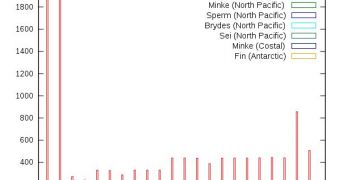New Zealand and Australia announce that they will begin their own whaling programs, which will use non-lethal means to study cetaceans. The move is aimed directly against Japan, a country that seems unable to take a hint. The Asian nation poorly “disguises” its whale cull under a research program, and claims that it needs to kill about 1,000 whales per year in order to be able to study the animals. The new move by New Zealand and Australia is meant to demonstrate internationally that the justification Japan uses doesn't make any sense, the BBC News reports.
The joint research group will depart from Wellington, Australia in early February, and will feature 18 scientists. The team will analyze minke, humpback and blue whales, and will also seek to determine the influence that global warming has on the animals. The researchers hope that they will be able to disprove Japan's claims that only killing whales can offer sufficient clues about the creatures. In a perfect world, this would probably make sense, if it weren't for the fact that most whale meat that the Asian nation culls ends up on supermarket shelves. Commercial whaling is severely limited under an international, UN-mediated convention.
“Anyone can always come up with a project that you have to kill an animal to measure something. But the important question is whether or not you need that information – and our view very strongly is that all of that type of information that is relevant to the conservation and management of whales can be gathered using new and very powerful non-lethal tools,” Australian Antarctic Division expert Nick Gales explains. He is also the leader of the new expedition, which is planned to last for about six weeks. The scientist strongly believes that the arguments Japan is providing to support its whale cull are misguided and misleading.
Japanese officials have the nerve to say that there are “genuine scientific reasons” for killing up to 1,000 whales each year, in Antarctica and the North Pacific. Governments that critic Japan's actions, including those of Australia and New Zealand, say that these “reasons” are a mere cover for hunting whales and selling their meat for commercial purposes. This is forbidden under the aforementioned international moratorium, but the Asian nation has found a loophole in the convention that allows the culling of whales for scientific reasons. Other nations in the UN seem blind to this trespassing on the convention, because they otherwise risk losing their economic relationships with the Asian country.

 14 DAY TRIAL //
14 DAY TRIAL //